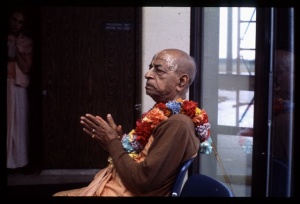SB 7.11.1: Difference between revisions
m (1 revision(s)) |
(Vanibot #0018 edit: make synonym terms in Sanskrit italic in SB - Vanisource) |
||
| Line 1: | Line 1: | ||
{{info | {{info | ||
|speaker= | |speaker=Śukadeva Gosvāmī | ||
|listener= | |listener=Maharaja Pariksit | ||
}} | }} | ||
[[Category:Srimad-Bhagavatam - Canto 07 Chapter 11|s01 ]] | |||
[[Category:Bhagavatam Verses Spoken by Sukadeva Gosvami - Vanisource|071101]] | |||
<div style="float:left">'''[[Srimad-Bhagavatam]] - [[SB 7|Seventh Canto]] - [[SB 7.11: The Perfect Society: Four Social Classes|Chapter 11: The Perfect Society: Four Social Classes]]'''</div> | |||
<div style="float:right">[[File:Go-previous.png|link=SB 7.11 Summary]] '''[[SB 7.11 Summary]] - [[SB 7.11.2]]''' [[File:Go-next.png|link=SB 7.11.2]]</div> | |||
{{RandomImage}} | |||
==== TEXT 1 ==== | ==== TEXT 1 ==== | ||
<div | <div class="verse"> | ||
śrī-śuka uvāca | :śrī-śuka uvāca | ||
śrutvehitaṁ sādhu sabhā-sabhājitaṁ | :śrutvehitaṁ sādhu sabhā-sabhājitaṁ | ||
mahattamāgraṇya urukramātmanaḥ | :mahattamāgraṇya urukramātmanaḥ | ||
yudhiṣṭhiro daitya-pater mudānvitaḥ | :yudhiṣṭhiro daitya-pater mudānvitaḥ | ||
papraccha bhūyas tanayaṁ svayambhuvaḥ | :papraccha bhūyas tanayaṁ svayambhuvaḥ | ||
</div> | </div> | ||
| Line 18: | Line 23: | ||
==== SYNONYMS ==== | ==== SYNONYMS ==== | ||
<div | <div class="synonyms"> | ||
śrī-śukaḥ | ''śrī-śukaḥ uvāca''—Śrī Śukadeva Gosvāmī said; ''śrutvā''—hearing; ''īhitam''—the narration; ''sādhu sabhā-sabhājitam''—which is discussed in assemblies of great devotees like Lord Brahmā and Lord Śiva; ''mahat-tama-agraṇyaḥ''—the best of the saintly persons (Yudhiṣṭhira); ''urukrama-ātmanaḥ''—of he (Prahlāda Mahārāja) whose mind is always engaged upon the Supreme Personality of Godhead, who always acts uncommonly; ''yudhiṣṭhiraḥ''—King Yudhiṣṭhira; ''daitya-pateḥ''—of the master of the demons; ''mudā-anvitaḥ''—in a pleasing mood; ''papraccha''—inquired; ''bhūyaḥ''—again; ''tanayam''—unto the son; ''svayambhuvaḥ''—of Lord Brahmā. | ||
</div> | </div> | ||
| Line 25: | Line 30: | ||
==== TRANSLATION ==== | ==== TRANSLATION ==== | ||
<div | <div class="translation"> | ||
Śukadeva Gosvāmī continued: After hearing about the activities and character of Prahlāda Mahārāja, which are adored and discussed among great personalities like Lord Brahmā and Lord Śiva, Yudhiṣṭhira Mahārāja, the most respectful king among exalted personalities, again inquired from the great saint Nārada Muni in a mood of great pleasure. | Śukadeva Gosvāmī continued: After hearing about the activities and character of Prahlāda Mahārāja, which are adored and discussed among great personalities like Lord Brahmā and Lord Śiva, Yudhiṣṭhira Mahārāja, the most respectful king among exalted personalities, again inquired from the great saint Nārada Muni in a mood of great pleasure. | ||
</div> | </div> | ||
__NOTOC__ | |||
<div style="float:right; clear:both;">[[File:Go-previous.png|link=SB 7.11 Summary]] '''[[SB 7.11 Summary]] - [[SB 7.11.2]]''' [[File:Go-next.png|link=SB 7.11.2]]</div> | |||
__NOTOC__ | |||
__NOEDITSECTION__ | |||
Revision as of 05:34, 1 December 2017

A.C. Bhaktivedanta Swami Prabhupada
TEXT 1
- śrī-śuka uvāca
- śrutvehitaṁ sādhu sabhā-sabhājitaṁ
- mahattamāgraṇya urukramātmanaḥ
- yudhiṣṭhiro daitya-pater mudānvitaḥ
- papraccha bhūyas tanayaṁ svayambhuvaḥ
SYNONYMS
śrī-śukaḥ uvāca—Śrī Śukadeva Gosvāmī said; śrutvā—hearing; īhitam—the narration; sādhu sabhā-sabhājitam—which is discussed in assemblies of great devotees like Lord Brahmā and Lord Śiva; mahat-tama-agraṇyaḥ—the best of the saintly persons (Yudhiṣṭhira); urukrama-ātmanaḥ—of he (Prahlāda Mahārāja) whose mind is always engaged upon the Supreme Personality of Godhead, who always acts uncommonly; yudhiṣṭhiraḥ—King Yudhiṣṭhira; daitya-pateḥ—of the master of the demons; mudā-anvitaḥ—in a pleasing mood; papraccha—inquired; bhūyaḥ—again; tanayam—unto the son; svayambhuvaḥ—of Lord Brahmā.
TRANSLATION
Śukadeva Gosvāmī continued: After hearing about the activities and character of Prahlāda Mahārāja, which are adored and discussed among great personalities like Lord Brahmā and Lord Śiva, Yudhiṣṭhira Mahārāja, the most respectful king among exalted personalities, again inquired from the great saint Nārada Muni in a mood of great pleasure.